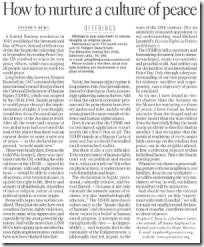This article published in the Edmonton Journal yesterday was a small expansion of a previous post. International Peace Day being September 21, it was also five days late, and so was edited accordingly. Nevertheless the important parts were retained. Basically it’s me banging my drum again.
Technorati Tags: Universal Declaration of Human Rights,UDHR,Eleanor Roosevelt,gospel,magna carta,scapegoating mechanism


Great article as usual, Steve, and I resonate with the whole. Except … a “non-violent Jesus”? What about his diatribe against the Pharisees (Matt. 23) and his driving out of the money-changers? Both of these I think were actions for justice. Is there n/ever a time for violence?
No, never for violence, but always for creative anger and active nonviolence. Like Daniel Berrigan breaking into a federal building in Catonsville and destroying selective service records as a protest agianst the Veitnam war. Jesus was fine with that.
Thanks for your thoughts and comments Sam.
I need to push you a bit here. I would suggest that Daniel Berrigan committed a violent act. Notice the language – “break” in; “destroy”.
Further to the above, Berrigan “violated” their space. But I can see Jesus being happy with it.
Some proponants of force also accuse pacifists of “violent” provocation when they simply get in the way.
However, language noted. And you have a point. Thomas Merton also questioned some of Berrigan’s methods. But selective “violence” to property is something other than violating–harming a body. In some contexts, “destroying” a piece of property is a legitimate act of nonviolence as it may be the only avenue open to drawing attention to horrendous acts of state-sponsored violence. At the same time I think the nonviolent activist needs to do some serious reflection before throwing a rock through a window.
But Steve – a nonviolent rock through a window? I would call this violent and rather extreme in fact. But here’s my perspective on this. Foucault said “knowledge is violence.” The application of this to my work of counselling is the recognition that every question I ask and every statement I make is somehow intrusive, i.e., it does violent. Therefore I need to attend to whether my question will be welcomed, whether I have earned the right to ask it. So, I guess I have a different picture of violence. I maintain that it’s more than simply bodily harm. I recall the violation I felt when I discovered once that our house had been broken into. And so, I maintain that there is a place for violence. Evil needs to be confronted and resisted.
Evil needs to be confronted and resisted. Absolutely. You would use “violence” to confront and resist. I would use nonviolence.
I use quotation marks with your use of the term because your definition of violence is fluid. And I don’t have a problem with that as long as we’re always aware of context. Yes, an uninvited question may very well be personally violent within the borders of a family tragedy–or within the heightened emotional uncovering of a trauma without sufficient relational connection, while in one of your counselling sessions. But is an uninvited question within, say, a political debate violent? If so, then the word, you have to agree, becomes lingually gelatinous.
So now, keeping in mind the allegiance we must keep with context, let me take you back to the rock through the window, which you described as “violent and rather extreme.” Well, let’s see. Suppose that behind the window lies the blueprint to the latest long-range nuclear missile. How extreme is it to brake the window of this ICBM facility and tear up the blueprints? Here, wouldn’t you say, the violence lies in walking by and not throwing the rock? (Unless of course the development of nuclear arms poses no moral difficulty.)
You were right to feel personally violated when your house was broken into. (I well understand the feeling, having undergone such incidents.) And in that context, a personal violence was done to you. But if I’m committing violence by asking intrusive questions of the Minister of National Defence in the frame of my country’s military occupation of another country, then I will, by your definition, choose “violence”. But I choose–I believe with merit and in following the lead people like Dorothy Day and John Dear–to see this questioning, this impeding, where warranted, even to the point of defacing state property, not personal property, as active nonviolence. Such was the context of Jesus’ driving out of the Investors Group.
In resisting and confronting evil Daniel Barrigan would never break into your house. But he WOULD break into a missile complex and pour abattoir blood on nuclear warheads aimed at enemies so as to forestall a retaliatory missile aimed at all our houses; more importantly, so as to bring a needed awareness of the human propensity to violence in all it’s forms–so as to invoke, at least, a pause–so as to create a possibility.